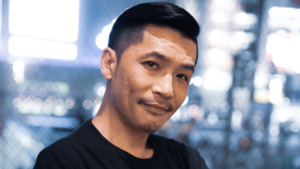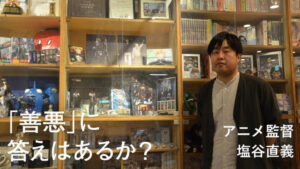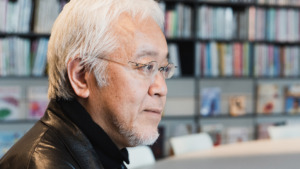Photo taken by ICC
Paso a Paso. One step at a time.
By Kailyn Huang
Paul Salopek was supposed to be in Russia. In 2013, the former war correspondent and two-time Pulitzer Prize winner embarked on his Out of Eden Walk, retracing humanity’s migration from the cradle of Africa to southernmost Latin America, traveling almost exclusively on foot to document the tales of those he meets along the way. The trip was projected to last seven years. Over 12 years later, Salopek finds himself still walking, in a place he never expected to be.
On the afternoon of April 25, a heavy blanket of clouds draped the world in gray. Yet inside a lecture hall hidden behind the medieval-style corridor beneath Waseda University’s iconic Okuma Memorial Hall, whispered excitement filled the air. Salopek, who has been walking across Japan since April, paused his journey in Gifu prefecture to deliver a speech in Tokyo, sharing insights gained throughout his remarkable career. Afterward, he sat down with Waseda LINKS to discuss the art of living.
Salopek is dressed like a hiker at all times. He comes in wearing a Patagonia shirt and Merrell shoes– there’s no room in his backpack for suits and ties. It’s evidence of the first lesson learned on his Out of Eden Walk: travel light, because “the desert teaches by taking away.”
His outward simplicity belies the depth of a man who has dedicated his life to learning. He doesn’t need notes to captivate an audience with his knowledge of conflict in Africa and the Middle East, paleoanthropology, environmental biology, animal husbandry, and climate change. He is the quintessential wandering storyteller: born in California and raised in Mexico, with a career spanning continents.
“Be careful with stereotypes,” he jokes. “I’m a Mexican villager in disguise.”
Journalists like Salopek are few and far between. After decades of “flying from story to story,” he turned to slow journalism, which he describes as walking “through the great stories of the day at five kilometers an hour.” His goal, he says, is to link humanity’s untold stories “like beads on a string.” Salopek’s journey offers two profound lessons: everything is connected, and slowness reveals truths that would otherwise remain hidden.
Salopek’s concept of slowness doesn’t mean moving at a snail’s pace; it simply requires intention. Life, by nature, is chaotic. Still, it’s possible to filter out the noise, to extend one’s consciousness beyond the self, and become grounded in the present.
One need not undertake an epic journey to realize the benefits of mindful travel. The Out of Eden Walk is open to everyone– it’s why Salopek regularly pauses his journey to share the value of simply noticing the world, and searching for the stories that surround us. Even those who are caught in the dizzying pace of a megalopolis like Tokyo can enjoy slowness, he says.
“We do these kinds of micro-migrations already. We maybe don’t do it consciously all the time. But even a short walk is good. It’s one way to cope, and it doesn’t cost anything. Walk to work, walk to school, rather than take the metro. If you’re lucky enough to have the ability of your body, just use it.”
The conscious effort to reconnect physically with our immediate environment underscores a modern paradox: although global connectivity is now more accessible than our ancestors could have ever imagined, our personal worlds have contracted inward– phones, not people, now serve as our primary points of contact. Consequently, the loneliness epidemic, in Japan and beyond, is no mystery to Salopek.
“We’re still walking around the Earth with Stone Age minds. We haven’t had time to adapt,” Salopek explains. “Community, I think we miss it. It’s kind of in our collective memory.” Compared to the long stretch of human history, our hyperconnected yet isolated modern world is a blip in time.
The point isn’t to reject technology. Much of Salopek’s work occurs online– the Out of Eden Walk itself relies fundamentally on digital networks. Instead, the key lies in finding community, whether online, in person, or simply in the companionship of a pet.
“Wherever you pour your heart is important,” Salopek emphasizes. To those struggling to connect, he offers a reminder: “99% of what we’re concerned about is the same.”
Yet, Salopek is careful to note that the concept of community is a slippery slope: many falsely believe that it requires conformity, which can erase identity. But true belonging, he suggests, only asks for authenticity. We already belong, exactly as we are.
“Everyone is unique. That’s where the story lives,” he says, taking his own nomadic background as an example. Culturally, he’s not quite ‘American,’ (“I dream in Spanish. I fell in love in Spanish.”) though his tall, lanky figure stands out in Mexico.
Conversely, Salopek explains, “not fitting in is the key to fitting in everywhere.”
It’s precisely this appreciation for ‘otherness’ that has allowed him to honor the many cultures he’s encountered along the way. There’s always something new to be learned, a perspective to discover for the first time.
Movement, he insists, is crucial: “When you stay in one place, you stop seeing it.”
Not everyone needs to travel the world in order to fight complacency. Instead, seek out the unknown. Allow the mind to relish surprise– you might just find it in that menu item you never thought to order. And if it tastes terrible? Well, now you know.
Salopek knows a thing or two about life’s great uncertainties. Yet, a month imprisoned in war-torn Sudan and a journey that was never supposed to reach the shores of Japan are hardly the most remarkable diversions he’s encountered.
“Nobody moves in one direction,” he affirms. This is coming from someone who once worked on the high seas, at a convenience store, and on a cattle ranch. Even his career in journalism is the result of a happy accident: after his motorcycle broke down in New Mexico, he took on a police reporting job to pay for repairs.
For Salopek, life is an “open road,” a “continuous journey.” Unplanned routes are not only expected, but welcome.
Though he’s witnessed more than most, it would be a mistake to say that life has hardened him. When he speaks, his voice is soft, considerate.
If anything, his journeys have deepened his empathy, for others as well as himself.
His advice is to begin with a general direction: focus on what’s actionable, but remain open to change. Salopek cautions against over-planning, which often leads to unnecessary anxiety and disappointment.
“The key is knowing what’s important to be worried about and what’s not. Slowing down helps sort that out.”
He stresses the improvisational nature of the Out of Eden Walk, which has seen its fair share of obstacles: denied visas, Covid-related delays, and the Russo-Ukrainian war have all required major rerouting. But it would be impossible to make an itinerary out of an adventure. After all, early humans made their way across continents precisely because they embraced uncertainty and led with curiosity.
After nearly a decade of war coverage, Salopek has learned to approach difficult moments with gentle humor, and chuckles when he shows his map log of police stops encountered during the walk.
Life is rarely about control. Oftentimes, it’s about letting go. The best things, Salopek says, happen unexpectedly. He’s never sure of where he’ll find himself or whom he’ll meet along the way, but the joy is in not knowing.
“Our task is to love the unknown,” he reveals, paraphrasing the poet Rilke. “That’s what I do. I’m walking into the unknown every day. I don’t really know what’s going to happen. Every single day is new, and I have to learn to love it.”
Moving forward anyway is what makes us human.
Salopek, like all of us, faces difficulties each day. Walking with a 15-kilogram pack, sometimes through extreme climates, inevitably takes its toll. He’s been doing this for the past twelve years.
When asked about where he finds the resolve to keep going, he briefly slips into Spanish, not for the first time this evening. “Poco a poco. Paso a paso. Step by step is the way I do it.”
The very idea of walking from Africa to the Americas is difficult to grasp. But Salopek isn’t thinking about how much distance remains. For him, tomorrow is just another step.
Embrace the adventure, because the journey is the destination.










